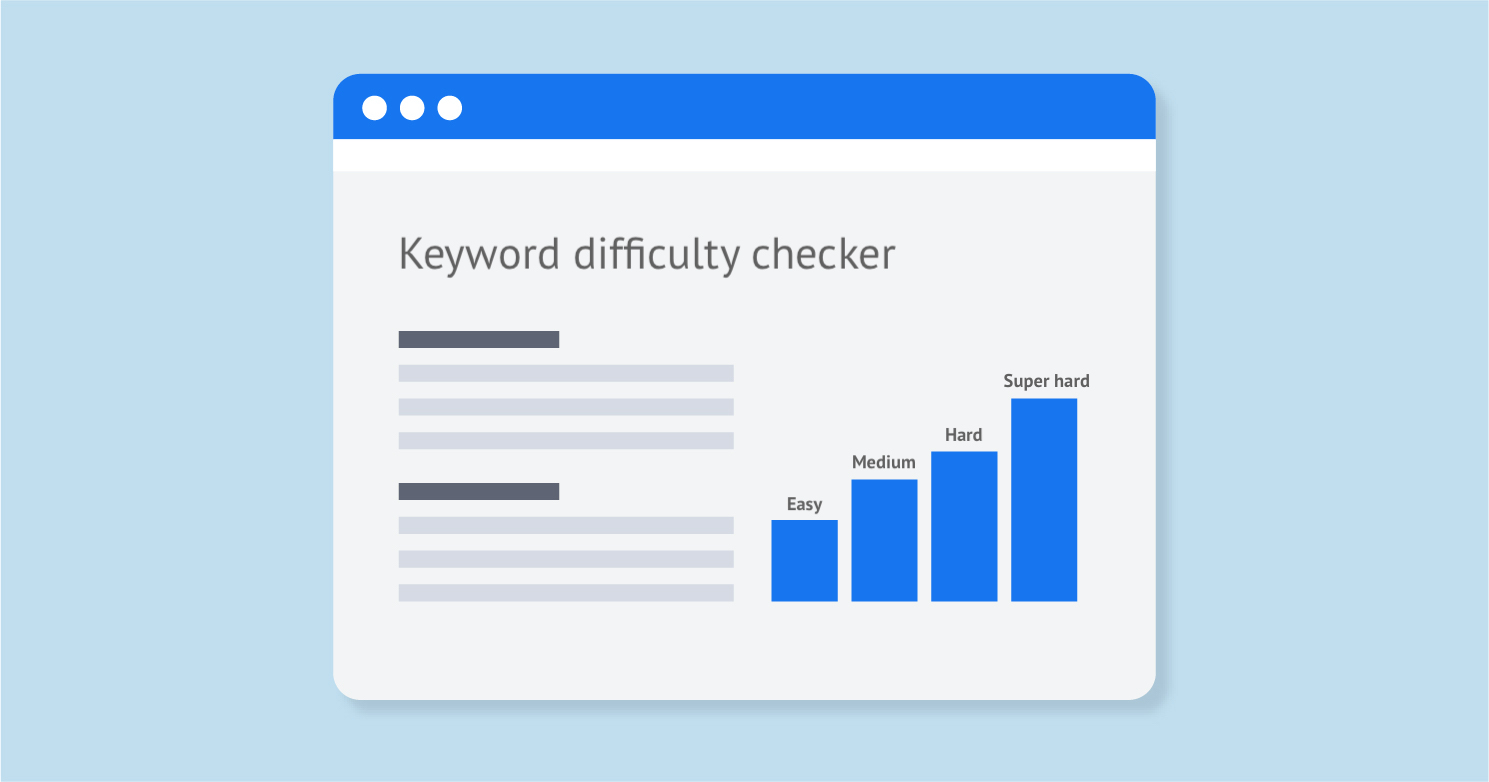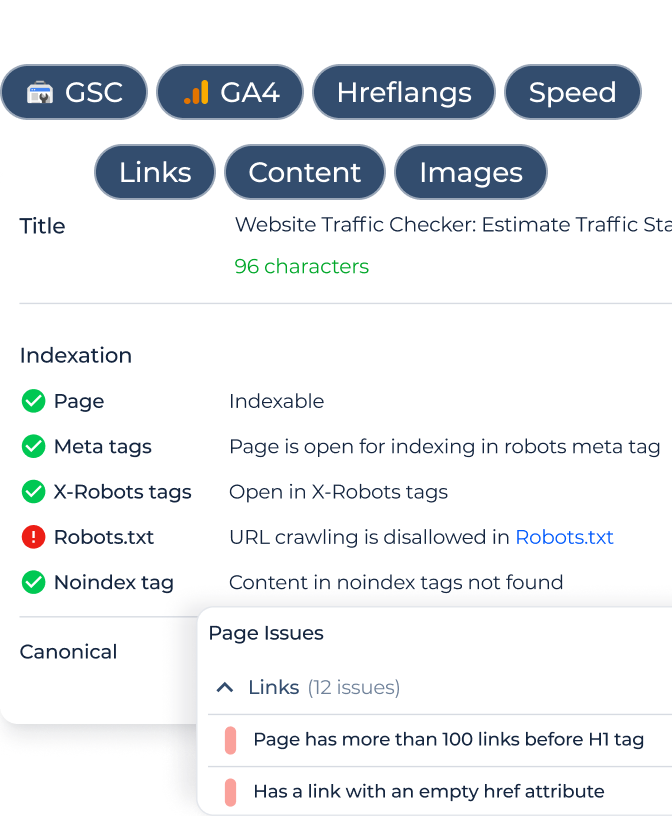It’s easy to drive traffic to your website using particular keywords, but would they help your page rank higher? There are plenty of ways to help your page rise to the top searches in Google, Bing, or other engines, and keyword difficulty is the metric that matters the most in this case.
But how do you measure it, and how high should it be? In this article, we’ll tell you more about keyword difficulty, why it’s crucial for your SEO strategy, and what helps you handle it properly. Keep reading to learn some valuable insights!
What Is Keyword Difficulty
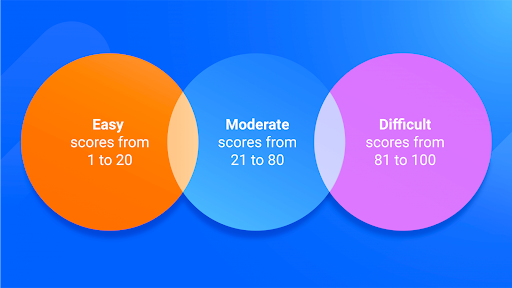
By definition, keyword difficulty is a metric that shows how hard it is for a keyword to rank high in search engines. It’s measured with a scale from 1 to 100. The higher the number, the harder it is to rank with the given keywords.
With the development of various tools and search engine advancements, keyword difficulty is a cumulative metric that incorporates a variety of factors, and it can depend on what service you’re using or what metric matters more to you. Indeed, each SEO platform can measure it differently. Thus, whether you’re using Ahrefs, Semrush, or other services for this purpose, you’ll get different results.
To maintain high-ranking scores and not get into a very competitive niche, you should keep your keyword difficulty score between 21% and 80%. This is the optimal value that helps you easily handle the competition and adequately manage all the keywords on your web page.
Why Is Keyword Difficulty Important?
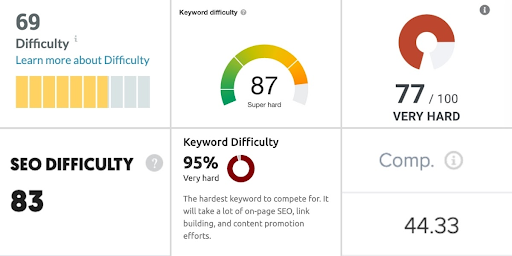
Keyword difficulty is initially crucial for keyword research, meaning it helps you define what keywords are worth integrating into your website. You get to see which ones are competitive enough for your business but not too hard to handle. Plus, it influences your SEO strategy and planning. KD helps you see the most relevant and efficient keywords you should use and save time searching for more sophisticated, competitive ones.
With the help of keyword difficulty, you’ll also be able to define good alternatives for your niche with nice ranking chances and start growing faster even if you’re just entering the market. Keep an eye on your website’s KD if you want to rank high and handle competition in your niche.
Want to learn how to improve your website ranking and more?
Crawl your site and find out all kind of issues that can hart your users or your website SEO.
Key Factors to Understand Keyword Difficulty
KD is used as a generalized term for a variety of factors that actually help your website rank higher than others. Let’s have a look at some of the most influential ones.
Your competitors

This metric goes down to measuring how authoritative your competitors are. By running an analysis of other businesses in your niche, you’ll see what keywords help them rank higher and which ones you can implement into your website.
You should also consider their content quality, backlinks, and on-page optimization. The more authoritative and trusted the page is, the harder it will be to beat them.
Content Quality

Your website’s content quality helps you compete with other sites and rank higher together with more reputable resources. Adding high-ranking, moderately difficult keywords isn’t enough if you want to drive traffic and maintain your page’s high positions. People are paying attention to quality content, long-reads, and engaging blogs, so hire a professional content team to help you create a popping website.
Plus, to ensure your content isn’t overfilled with keywords or lacks them, try a keyword density checker tool to constantly keep track of your pages’ SEO.
Search intent
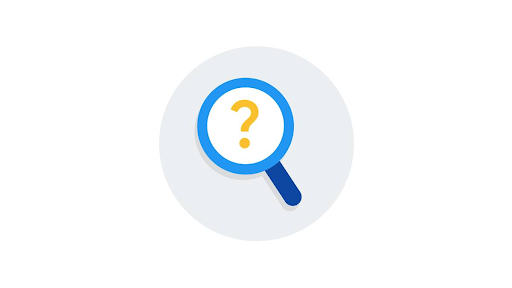
This is what your current and potential customers expect to see while searching for a particular keyword. The types of intent include:
- Commercial — a buying guide or a product review
- Transactional — a product page with a comprehensive description or a pricing page
- Navigational — this can be the main page of your website
- Informational — an explainer video or a blog post
To make it work, do a quick evaluation of search results while you’re looking for a particular keyword and see what pages different queries lead you to. Look at what works best and implement the top practices on your webpage.
Backlinks

Adding more backlinks and connecting them to high-ranking keywords increases your website’s trustworthiness and shows that other sources and companies rely on you well enough to promote themselves on your page.
It’s necessary to maintain high authority for ranking higher in search engines. This enhances your reputation and makes more potential customers trust you and try your products or services. Hire a link-building team or a good outreach specialist experienced in your niche and let them do the magic.
Domain authority

Domain authority significantly impacts your rankings. Even if the competition is relatively low and you create great content, your page must contain at least several backlinks in the first place. Build your domain trust step by step — analyze potential partners, add more backlinks, link them to high-ranking keywords with a moderate difficulty index, and see how your competitors do that.
What Is a Good Keyword Difficulty Score?
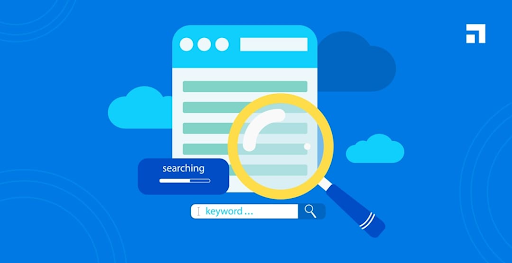
You should keep a moderate keyword difficulty score to maintain your website’s high ranks. Try not to overplay with way too complex keywords that are highly competitive and require tremendous effort to beat. However, you shouldn’t do all the easiest ones either.
The optimal choice for most websites is to keep the KD score between 21% and 80%. You can evaluate how high your website’s keyword difficulty is on various SEO platforms, and you can even compare the data with other popular sources. Anyway, you should also keep in mind multiple factors, and don’t forget that different services use different metrics to measure the KD.
What Is an Easy Keyword Difficulty Score?

An easy keyword difficulty score means a keyword is super easy to find and rank for, and that it’s also more generic. Since the most optimal KD score starts from 21%, everything below this level can be considered an easy keyword. If you’ve got a lower score, it’ll be easier for you to rank on the first SERP.
Final Thoughts
Keyword difficulty is what you should always consider while working on your SEO strategy and picking the right keywords for your website. Whether you’re updating the content or releasing a new web page, KD will help you beat your competitors and rank high in your niche. Remember to consider your competitors, content quality, and other factors while evaluating the KD of the keywords you want to rank for.
And, whether you want to know if your website is already ranked to particular keywords, you can use our Rank Checker tool — you’ll get valuable insights in a few moments!
How is keyword difficulty calculated?
However, many companies and SEO experts state that it is necessary to consider a range of other factors while calculating the KD. These include the number of domain links, domain rating, relevancy, content length, etc. You can use the formulas offered by famous SEO companies and platforms like Ahrefs to calculate the keyword difficulty faster.
